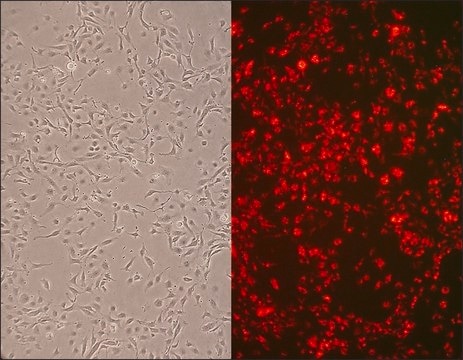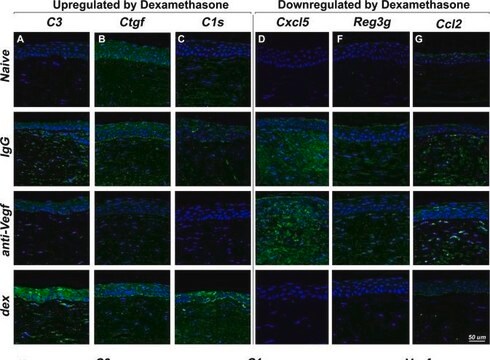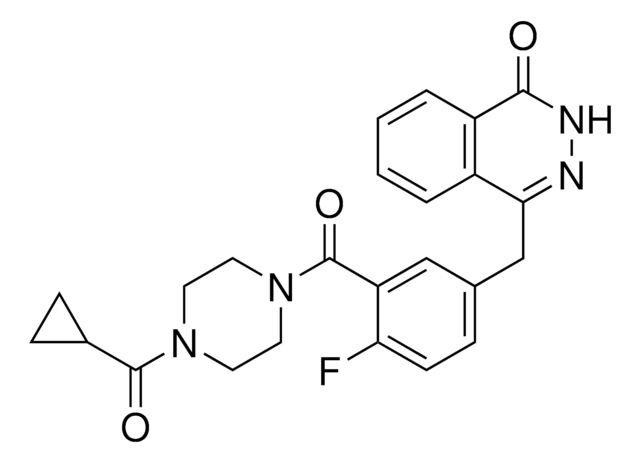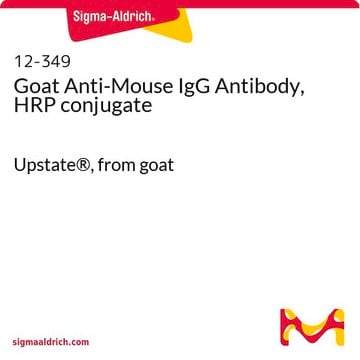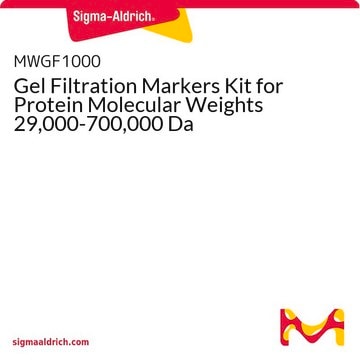CN304-05
Canine Aortic Endothelial Cells: CnAOEC (Cryovial)
Sinónimos:
Endothelial cell line
Iniciar sesiónpara Ver la Fijación de precios por contrato y de la organización
About This Item
UNSPSC Code:
41106514
NACRES:
NA.81
Productos recomendados
biological source
canine aorta
packaging
pkg of 500,000 cells
manufacturer/tradename
Cell Applications, Inc
growth mode
Adherent
karyotype
2n = 78
morphology
Endothelial
technique(s)
cell culture | mammalian: suitable
relevant disease(s)
diabetes; cardiovascular diseases
shipped in
dry ice
storage temp.
−196°C
General description
Lot specific orders are not able to be placed through the web. Contact your local sales rep for more details.
CnAOEC provide a useful model to study cardiovascular diseases and test potential therapeutic agents, not only important from a veterinary perspective, but also having implications for human health. In a study aiming to adapt an immunomagnetic isolation protocol used in human patients to isolate circulating endothelial cells in dogs, CnAOEC cells were shown to be positive for von Willebrand factor, CD146 and stained with Ulex europaeus agglutinin 1 (Wills, 2009). To investigate the mechanism of N-terminal portion of pro C-type natriuretic peptide (NT-pCNP), a sepsis biomarker in humans and dogs, CnAOEC were treated with a variety of agents and it was found that lipopolysaccharide, TNF-α and IL-1β, but not IL-6, IL-10, IL-21, CXCL-8, IFN-γ, VEGF-A, stimulated NT-pCNP production (Osterbur, 2012, 2013). CnAOEC were also used to demonstrate vasoprotective activity of pomegranate and soy isoflavons in order to prevent endothelial disfunction in dogs which commonly leads to cardiovascular disease (Baumgartner-Parzer, 2012). Finally, CnAOEC were utilized as a control to compare the growth of normal canine endothelial cells and aggressive canine hemangiosarcoma cells in a study investigating signaling pathways underlying hemangiosarcoma oncogenesis (Murai, 2012), and as a VEGFR2-positive control in a study aimed at understanding the reasons for reduced numbers of circulating progenitor cells in cardiovascular disease (Boilson, 2010).
CnAOEC provide a useful model to study cardiovascular diseases and test potential therapeutic agents, not only important from a veterinary perspective, but also having implications for human health. In a study aiming to adapt an immunomagnetic isolation protocol used in human patients to isolate circulating endothelial cells in dogs, CnAOEC cells were shown to be positive for von Willebrand factor, CD146 and stained with Ulex europaeus agglutinin 1 (Wills, 2009). To investigate the mechanism of N-terminal portion of pro C-type natriuretic peptide (NT-pCNP), a sepsis biomarker in humans and dogs, CnAOEC were treated with a variety of agents and it was found that lipopolysaccharide, TNF-α and IL-1β, but not IL-6, IL-10, IL-21, CXCL-8, IFN-γ, VEGF-A, stimulated NT-pCNP production (Osterbur, 2012, 2013). CnAOEC were also used to demonstrate vasoprotective activity of pomegranate and soy isoflavons in order to prevent endothelial disfunction in dogs which commonly leads to cardiovascular disease (Baumgartner-Parzer, 2012). Finally, CnAOEC were utilized as a control to compare the growth of normal canine endothelial cells and aggressive canine hemangiosarcoma cells in a study investigating signaling pathways underlying hemangiosarcoma oncogenesis (Murai, 2012), and as a VEGFR2-positive control in a study aimed at understanding the reasons for reduced numbers of circulating progenitor cells in cardiovascular disease (Boilson, 2010).
Cell Line Origin
Aorta
Application
cardiovascular function, studies on immune system and graft rejection, development of 3D endothelialized engineered tissues, drug discovery, stent-graft compatibility testing
Components
Canine Endothelial Cell Basal Medium containing 10% FBS & 10% DMSO
Preparation Note
- 2nd passage, >500,000 cells in Canine Endothelial Cell Basal Medium containing 10% FBS & 10% DMSO
- Can be cultured at least 16 doublings
Subculture Routine
Please refer to the CnAOEC Culture Protocol.
Storage Class
11 - Combustible Solids
wgk_germany
WGK 3
flash_point_f
Not applicable
flash_point_c
Not applicable
Certificados de análisis (COA)
Busque Certificados de análisis (COA) introduciendo el número de lote del producto. Los números de lote se encuentran en la etiqueta del producto después de las palabras «Lot» o «Batch»
¿Ya tiene este producto?
Encuentre la documentación para los productos que ha comprado recientemente en la Biblioteca de documentos.
Nuestro equipo de científicos tiene experiencia en todas las áreas de investigación: Ciencias de la vida, Ciencia de los materiales, Síntesis química, Cromatografía, Analítica y muchas otras.
Póngase en contacto con el Servicio técnico